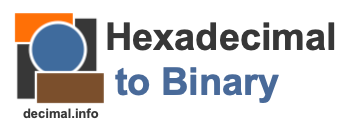
Here we will show you how to convert the hexadecimal number DBA0 to a binary number. First note that the hexadecimal number system has sixteen different digits (0 1 2 3 4 5 6 7 8 9 A B C D E F) and the binary number system has only two different digits (0 and 1).
The four steps used to convert DBA0 from hexadecimal to binary are explained below.
Step 1)
Multiply the last digit in DBA0 by 16⁰, multiply the second to last digit in DBA0 by 16¹, multiply the third to last digit in DBA0 by 16², multiply the fourth to last digit in DBA0 by 16³, and so on, until all the digits are used.
0 × 16⁰ = 0
A × 16¹ = 160
B × 16² = 2816
D × 16³ = 53248
Remember that the hexadecimal number system has sixteen different digits, so when doing the above calculation, we use the following values if applicable: A=10, B=11, C=12, D=13, E=14, and F=15.
Step 2)
Next, we add up all the products we got from Step 1, like this:
0 + 160 + 2816 + 53248 = 56224
Step 3)
Now we divide the sum from Step 2 by 2. Put the remainder aside. Then divide the whole part by 2 again, and put the remainder aside again. Keep doing this until the whole part is 0.
56224 ÷ 2 = 28112 with 0 remainder
28112 ÷ 2 = 14056 with 0 remainder
14056 ÷ 2 = 7028 with 0 remainder
7028 ÷ 2 = 3514 with 0 remainder
3514 ÷ 2 = 1757 with 0 remainder
1757 ÷ 2 = 878 with 1 remainder
878 ÷ 2 = 439 with 0 remainder
439 ÷ 2 = 219 with 1 remainder
219 ÷ 2 = 109 with 1 remainder
109 ÷ 2 = 54 with 1 remainder
54 ÷ 2 = 27 with 0 remainder
27 ÷ 2 = 13 with 1 remainder
13 ÷ 2 = 6 with 1 remainder
6 ÷ 2 = 3 with 0 remainder
3 ÷ 2 = 1 with 1 remainder
1 ÷ 2 = 0 with 1 remainder
Step 4)
In the final step, we take the remainders from Step 3 and put them together in reverse order to get our answer to DBA0 hexadecimal to binary:
DBA0 hexadecimal = 1101101110100000 binary
Hexadecimal to Binary Converter
Here you can convert another hexadecimal number to binary.
DBA1 hexadecimal to binary
Go here for the next hexadecimal number on our list that we have converted to binary.
Copyright | Privacy Policy | Disclaimer | Contact
